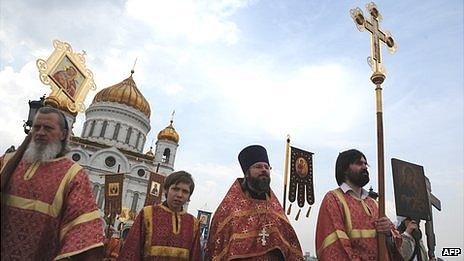Russian Orthodox Church defiant over Pussy Riot trial
- Published

The trial of the female punk rock band Pussy Riot has sharply divided liberals and conservatives in Russian society.
Three members of Pussy Riot are awaiting a verdict on their highly controversial performance of a protest song against Vladimir Putin in Moscow's main cathedral - Christ the Saviour - in March.
Many liberals who sided with the group feel the Orthodox Church's leader, Patriarch Kirill, has overplayed its hand recently.
They point to his support for President Putin and refusal to publicly pardon the protesters.
But more traditional believers say the Patriarch needs to be given a chance to revive the Church's flagging attendance rates in a mainly Orthodox society.
Sergei Rybko understands the difficulty the Patriarch is facing.
In the Soviet Union he was a hippy, later becoming a priest who struggled against the communists' persecution of the Orthodox Church.
He is to this day a lover of rock music. He strives to convince other clergymen of the value in 1970s rock bands like Slade and Deep Purple.
He also attends rock concerts, telling crowds that freedom without God is impossible.
I assumed, since he has liberal views, he would defend the likes of Pussy Riot.
I was wrong.
"They should be given forced labour," he quipped. "That would be a suitable punishment.
"Anyway, they are not real punk musicians. They were paid to perform."
As we go inside the small monastery attached to Father Sergei's church in northern Moscow it becomes clear why he has such strong feelings.
"The Church needs time to equip itself with better PR skills. The previous Patriarch [Alexei II] had to revive the Orthodox Church from scratch. Now the Church is being attacked and that is not fair."
Conspiracy theories
Younger Orthodox Russians I spoke to, many of whom support Pussy Riot, disagree. They feel that their Patriarch is not maintaining the neutrality expected of him and is in fact legitimising the activity of the state.
"The Church connects people to God but now these two bodies - the Church and the government - are linked and it should not be like this," says Nikolai Polozov, a committed Orthodox Christian and the lawyer acting for Pussy Riot.
And yet the Church feels someone is out there to get them. As it struggles to boost its low attendances (fewer than 10% of Russians attend church regularly), it talks of a "smear campaign" being waged against the Patriarch.
It appeared to be referring to stories printed online in recent months alleging that its leader enjoyed luxuries that contravened the vow of poverty he took when he became a monk.
One concerned a lawsuit involving a large flat belonging to him in Moscow. It ended with damages of around $500,000 (£315,000) being awarded to a woman acting on behalf of the Patriarch.
But then there was the story about a $30,000 Swiss watch that the Patriarch was photographed wearing during a religious service in Ukraine in 2009.
In one photograph journalists noted that the watch had been airbrushed out, although its reflection could still be seen on the highly polished table where he was seated.
These episodes, while embarrassing for the Patriarch, may have been intentional, says Andrei Zolotov, a member of the Church and a journalist specialising in religion. He is the editor of Russia Profile magazine.
"I certainly don't rule out that people in the Kremlin may have decided that the Patriarch has too much weight and may want to put him in his place," he says.
Influencing politicians
I decided to put some of these points to senior bishops in the Church.
Metropolitan Hillarion heads the external relations department at the Moscow Patriarchate.
He would not answer on the impact the trial is having, but did talk about the relationship between Church and state.
He said that far from being a tool of the Kremlin, the Church is actually there to hold the government to account.
"There have been quite a number of cases when the Church expressed its dissatisfaction with government policies and we try to change these policies," he said.
"For example, if we know something is happening in the army and we are unhappy with that we engage in dialogue with the defence ministry and try to influence them. I see this way of collaboration as very fruitful."
Andrei Zolotov believes the recent scandals have only deepened the mistrust in society and that they will have a lasting effect.
"For the past 20 years after the Soviet-era persecution the Church had a right to rebuild. Now things unfortunately get back to normal. And normal means a confrontation between some of the radical elements in society - the leftists, the radicals - and the traditionalists."
You don't have to travel far in Moscow to meet people from each of these different categories, all with opposing views.
But most agree on one thing: that the Pussy Riot protest will have a lasting impact on the way the Church is seen in Mr Putin's Russia.
- Published9 August 2012
- Published11 April 2012
- Published6 March 2012